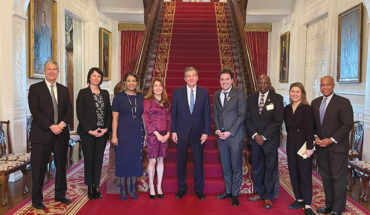by Tina Haver Currin
photographs by Tim Lytvinenko
If you happened to stroll by the Contemporary Art Museum at the beginning of the year, you may have noticed a cobalt shipping container parked in the gravel space in front of the museum. No, it wasn’t the return of the mobile beer garden known as the Wander Box. This was something new entirely: the BetaBox, a mobile prototyping lab developed by five young entrepreneurs, including one N.C. State Design School graduate. For $4,000 a week, they deliver the container to any location, where users have 24-hour access to a 3D printer and tools like a laser cutter and floor-to-ceiling whiteboards.
The BetaBox represents a new trend of rapid prototyping, where the development of new ideas can take place within days, instead of months or years. With the help of powerful three-dimensional modeling and the democratization of 3D printing, designers and entrepreneurs no longer need to send away to have prototypes created, or spend hours whittling them from foam or wood.
3D printers, which fall into the realm of “additive manufacturing,” generally work by melting a substance and depositing it onto a platform one layer at a time, almost like a hot glue gun, to match a digital model. With the touch of a button, designers can print models at home, school, or within a 25-foot shipping container.
Raleigh has emerged as a hub for this evolving technology.
In 2014, a company with local ties made history when a 3D-printed bust of President Barack Obama – with every line, crease, and wrinkle captured via high-resolution scans – was installed in the Smithsonian museum.
Meanwhile, Justin LeBlanc, the Project Runway design star (and Walter’s February cover story) is using the technology to make fourishes for his clothes, and to print bow ties he sells on his website. Family-run Plastibot is helping parents print artificial limbs for their children in a single afternoon. And Aly Khalifa from Raleigh’s Designbox is printing custom-made, eco-friendly shoes that can be assembled in 90 seconds. The variety of applications for 3D printing has the potential to touch every aspect of the market. Some think it may change the world.
Here are a few of 3D printing’s biggest players in Raleigh.
Designbox
Located in the Warehouse District in the heart of downtown, Designbox has supported local startup culture since 2003. With its collaborative workspace and large, floor-to-ceiling windows, the area functions as an office for local entrepreneurs, as well as a modest retail space for their creations. Designbox acquired its first 3D printer in 2007, a ZPrinter that allowed the team to go from design to prototype in three days.
“For us, it comes out of serving the clients. For more than a decade we’ve had a 3D printer working for them,” says Aly Khalifa, co-founder of Designbox along with his wife, Beth Khalifa. “We’re in the graphic design business too, and I’ll never forget when we got a desktop color printer. It was like, ‘Oh my gosh. Our whole world is changing!’ Now, it’s the same for product design. Instant gratification for what we’re doing on every design.”
Khalifa and the team at Designbox have used the technology to print tiny models of the store’s patrons during First Friday, custom awards for the Vilcek Prize (which have been on display at the Louvre in Paris), and most recently, a line of custom-made footwear called LYF.
But Khalifa thinks there’s a long way to go until the technology becomes a household staple.
“I liken it to having a hammer. A hammer is very pedestrian and lots of people can afford it, but does that mean that everyone’s going to make their own house, their own furniture? It’s great to have a tool like that, but there’s no substitution for knowledge and experience in design and engineering.”
Still, it opens up a lot of possibility. Khalifa is particularly inspired by a story told by Chris Anderson, the former editor of Wired magazine. His daughter loves dollhouses, but was having trouble decorating. So Anderson went online and found 3D models of furnishings, scaled them to his daughter’s own dollhouse, printed them, and painted them.
“They shared a sense of ownership, because they got to actually make the furniture,” says Khalifa. “The things that we make are things that we value because of shared human experience. And I think the really good news about 3D printing is that it allows people to get into making things, which I think is an important cultural need.”

Entrepreneur and author Ping Fu co-founded Geomagic, a software company that helped create digital models used in 3D printing. Her shoes and necklace are 3D printed by 3D Systems, the global company that acquired Geomagic in 2013.
3D Systems
One of 3D printing technology’s original innovators lives right here in the Triangle. Ping Fu, a 56-year-old entrepreneur and author, co-founded 3D software company Geomagic in 1997. Geomagic’s software helps create digital models that can be used by 3D printers. She has worked with everyone from NASA to Jay Leno – you can watch Fu demonstrating the technology to Leno, who seems absolutely stunned by it all, on her Vimeo page. Geomagic became an influential force at a time when 3D printing was still in its infancy.
It was enough to catch the attention of 3D Systems, a global corporation that employs more than 1,000 people in 25 different countries. 3D Systems acquired Geomagic in 2013, and Fu now serves as the company’s chief strategy officer. Though 3D Systems’ home base is in Rock Hill, S.C., Fu and her team of 85 work in Research Triangle Park.
As partners, they continue to innovate. 3D Systems’ newest machine offers production speeds 50 times faster than conventional technology, according to Jeff Blank, vice president of global engineering at the company. That translates to 4 billion drops of material placed per minute – fast enough to eventually upset traditional manufacturing processes.
Though the company has produced material for the aerospace, automotive, and healthcare industries – the orthodontic company Invisalign uses 3D Systems to print its aligners – it has recently gotten into something a little sweeter.
In 2013, 3D Systems introduced the ChefJet printer, the world’s first professionally certified, kitchen-ready 3D food printer. And in January, the company announced the creation of its Digital Kitchen, a “3D printed food experience” in Los Angeles.
ChefJet printers can print in sugar, candy, or chocolate, and can create colorful cake decorations and stunning sugar sculptures. If you’re hoping to have a taste, you can travel to Pennsylvania, where 3D Systems partnered with the Hershey Company to unveil a 3D-printed candy show at Hershey’s Chocolate World in December of 2014.
N.C. State University
N.C. State’s hyper-modern Hunt Library hasn’t lacked for praise since its opening in 2013. The American Institute of Architects awarded it a 2014 Educational Facility Design Award, and The San Francisco Chronicle called it one of “the most spectacular libraries in the world.” According to The Wall Street Journal, the Hunt Library has even influenced the renovations of the New York Public Library, due to its “collaborative spaces, stocked with tools for creative projects.”
One of those collaborative spaces is the library’s Makerspace, which offers a 3D scanner and two 3D printers for students, faculty, and staff. For $10 per cubic inch of material, users can print designs they’ve created – either alone, or with the help of university staff. That means a cost of $10 – $30 for a prototype about the size of a hand.
While there are already two printers available for use at the Hunt Library on Centennial Campus, D.H. Hill Library is also joining in. The university’s second Makerspace, which will house half a dozen 3D printers, is currently under construction. Adam Rogers, an Emerging Technology Services Librarian at N.C. State, says the space will open in the summer of 2015.
Among the new printers available at D.H. Hill will be the LulzBot Mini, an entirely open-source printer that can print in a variety of materials, and the Wanhao Duplicator, which allows users to print in two colors and also with dissolvable support material for shapes like spheres that need support while printing. And at Hunt Library, there’s the Fusion3, one of the largest affordable printers available, Rogers says.
The Fusion3 was designed by N.C. State graduate Chris Padgett, who opened his own 3D printing company in Greensboro after graduating from N.C. State with a degree in mechanical engineering in 2011.
At both Hunt Library and D.H. Hill, administrators like Rogers routinely hold classes and workshops to educate students and faculty on the technology.
“We view 3D printing as a new literacy,” Rogers says, “because the machines and the software are becoming so affordable. It’s something we think anybody on campus can become involved with and benefit from. It’s not just a design thing or an engineering thing. It’s a problem-solving thing.”
Plastibot
So just where do all of these 3D printers come from, anyway? One local business is supplying consumers, like N.C. State, with the parts, accessories, and workshops to bring 3D computer models to life. Plastibot, a three-person startup run by Gabriela Freeman and her husband, Luis Freeman, offers several ways for consumers to approach the technology.
As an engineer, Luis Freeman has worked with 3D printing technology for more than a decade. But within the last three years, he’s sensed a shift in the technology.
“Finally, he got to the point where he was like, ‘this is going to be good,’” says Gabriela Freeman, who manages marketing and outreach for the company. “He’s the one who brought me into it.” In 2012, the duo opened Plastibot near the Angus Barn in Raleigh.
Though it sells fully assembled printers, Plastibot is best known for its “DIY” workshops. In one twenty-hour sprint – typically over the course of a weekend – customers learn how to build their own 3D printers, including soldering, wiring, and assembly, all with the help of staff at Plastibot, of course.
“You start from scratch with all the materials, and at the end of the class, you have a fully functioning printer,” says Freeman. “We really encourage people to take this workshop and build their printer themselves. It gives them time to learn and ask questions.”
Plastibot also designs and prints prototypes for startups and businesses in Research Triangle Park, holds youth workshops at places like Wake Robotics, and even prints jewelry and art. This diversity is one of the reasons why the Freemans are so enthusiastic about offering the DIY workshops.
“We’ve noticed a trend of people who don’t have an engineering background, like artists, who need to understand how to work the machines, and how to troubleshoot them,” Freeman explains. “We want to make a difference. We want to develop a community for people who want to take this technology and push it forward. We want people to grow their own industries with it.”
Designbox
307 W. Martin St.
Monday-Friday: 11 a.m. – 4 p.m.
Closed Saturday & Sunday
MakerBot models range from $799 – $6,499
3D Systems
Geomagic
1001 Winstead Dr., Suite 400, Cary
Corporate Office
333 Three D Systems Circle, Rock Hill, SC
Personal 3D printers range from $999 – $4,900
Hunt Library Makerspace, N.C. State University
open to students, faculty, and staff
James B. Hunt Jr. Library (Room 4412)
1070 Partners Way
Sunday-Friday: 2 – 7 p.m.
Closed Saturday
$10 per cubic inch of material
Plastibot
5905 Triangle Dr.
Visitors by appointment only
Workshops starting at $925 (includes printer) – Next workshop: April 25-26, 10 a.m. – 8 p.m.
Fully assembled printer from $1,250
3D printer building kit from $775
Plastibot will occasionally print 3D models for a set-up fee of $10 + $0.50 per gram, or $5 per hour of run time (whichever is more expensive)







